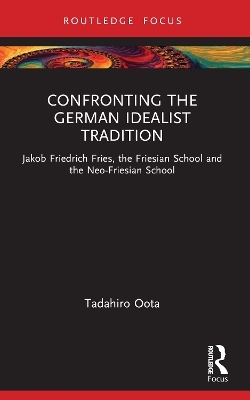
Confronting the German Idealist Tradition
Jakob Friedrich Fries, the Friesian School and the Neo-Friesian School
Seiten
2024
Routledge (Verlag)
978-1-032-52301-9 (ISBN)
Routledge (Verlag)
978-1-032-52301-9 (ISBN)
The philosophical activity of modern Germany represents a peak in the history of philosophy beginning from Thales in ancient Greece. This book attempts to reconsider the conventional image of 19th-century German philosophy. To this end, it illuminates a forgotten philosophical stream contemporaneous with so-called "German idealism."
From this perspective, this book examines the philosophy of Jakob Friedrich Fries, a philosopher contemporaneous and in confrontation with Hegel. By examining Fries’ standpoint, the book attempts to reconstruct the picture of 19th-century German philosophy. In the 19th and 20th centuries, philosophers other than Kant, Fichte, Schelling, and Hegel – especially Fries – had a significant influence on the history of philosophy, constituting an alternative genealogy to Hegel’s. One might say that the conventional history of philosophy conceals Fries’ influence. Accordingly, this book will examine Fries’ philosophy, the Friesian school established by E.F. Apelt, and the Neo-Friesian school formed by Leonard Nelson.
This approach reveals the factiousness of the history of philosophy that starts from Kant, passes through German idealism and flows into the Neo-Kantian movement. It will provide a new viewpoint from which to reconsider the history of German philosophy.
From this perspective, this book examines the philosophy of Jakob Friedrich Fries, a philosopher contemporaneous and in confrontation with Hegel. By examining Fries’ standpoint, the book attempts to reconstruct the picture of 19th-century German philosophy. In the 19th and 20th centuries, philosophers other than Kant, Fichte, Schelling, and Hegel – especially Fries – had a significant influence on the history of philosophy, constituting an alternative genealogy to Hegel’s. One might say that the conventional history of philosophy conceals Fries’ influence. Accordingly, this book will examine Fries’ philosophy, the Friesian school established by E.F. Apelt, and the Neo-Friesian school formed by Leonard Nelson.
This approach reveals the factiousness of the history of philosophy that starts from Kant, passes through German idealism and flows into the Neo-Kantian movement. It will provide a new viewpoint from which to reconsider the history of German philosophy.
Tadahiro Oota is an Assistant Professor at the National Institute of Technology, Numazu College (Japan). He is the author of a paper titled "Jakob Friedrich Fries as an Opponent of German Idealism," in: Anti-Idealism: Re-interpreting a German Discourse, De Gruyter, 2019.
Preface
1 Introduction
1.1 Why should 19th-century German philosophy be addressed today?
1.2 Why should we begin with the reconstruction of Fries’ philosophy?
2 Jakob Friedrich Fries’ philosophy
2.1 Fries’ conception of a critique of reason
2.2 On the construction of a metaphysical system: From the viewpoint of the method of philosophy
3 The Friesian and Neo-Friesian schools
3.1 The Friesian school
3.2 The Neo-Friesian school
4 Conclusion
Bibliography
| Erscheinungsdatum | 05.08.2023 |
|---|---|
| Verlagsort | London |
| Sprache | englisch |
| Maße | 138 x 216 mm |
| Gewicht | 222 g |
| Themenwelt | Geisteswissenschaften ► Philosophie ► Geschichte der Philosophie |
| Geisteswissenschaften ► Philosophie ► Philosophie der Neuzeit | |
| Sozialwissenschaften | |
| ISBN-10 | 1-032-52301-8 / 1032523018 |
| ISBN-13 | 978-1-032-52301-9 / 9781032523019 |
| Zustand | Neuware |
| Informationen gemäß Produktsicherheitsverordnung (GPSR) | |
| Haben Sie eine Frage zum Produkt? |
Mehr entdecken
aus dem Bereich
aus dem Bereich
eine Geschichte der Zuversicht von Homer bis zum Klimawandel
Buch | Hardcover (2024)
C.H.Beck (Verlag)
28,00 €
die kolonialen Wurzeln der französischen Theorie
Buch | Hardcover (2024)
Matthes & Seitz Berlin (Verlag)
28,00 €


